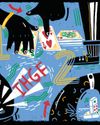
NEUROSCIENTIST
Imagine you had an accident that paralyzed your arms and legs.
So, you get fitted with a brain implant that lets you control robotic limbs, a computer, and more-using your mind. How incredible would that be? Nicholas "Nicho" Hatsopoulos is working toward achieving such mind-boggling goals. He is a neuroscientist at the University of Chicago in Illinois. There, he studies how the brain controls body movements and develops brain-computer interfaces (BCIS). A BCI is a system that interacts with the brain, making it possible for a person to control a computer or robot with their thoughts. It even allows a person to feel touch sensations via a robot hand.
Hatsopoulos co-founded the company Cyberkinetics Neurotechnology Systems and heads the University of Chicago's Hatsopoulos Lab. He has also won an award for his teaching.
WHAT FIRST GOT YOU INTERESTED IN HOW THE BRAIN CONTROLS MOVEMENT?
I saw a story about people building insect robots with very simple nervous systems that could exhibit really complex motor behavior. And I thought that was super cool. So, I ended up working in an insect lab [with locusts] and started recording from their brains. I was hooked.
AND NOW YOU GET TO WORK WITH HUMAN VOLUNTEERS. CAN A PERSON REALLY CONTROL A COMPUTER OR ROBOT WITH THEIR MIND?
We've successfully done it, at least in a research setting with human patients that have a spinal cord injury and that are partially paralyzed or completely paralyzed.
WOW! YOU'RE ALSO WORKING ON SIMULATING THE SENSE OF TOUCH. WHY IS THAT IMPORTANT?
This story is from the {{IssueName}} edition of {{MagazineName}}.
Start your 7-day Magzter GOLD free trial to access thousands of curated premium stories, and 9,000+ magazines and newspapers.
Already a subscriber ? Sign In
This story is from the {{IssueName}} edition of {{MagazineName}}.
Start your 7-day Magzter GOLD free trial to access thousands of curated premium stories, and 9,000+ magazines and newspapers.
Already a subscriber? Sign In

HOUSE OF CARDS
TRY THE PERFECT EXPERIMENT—AND THEN REFLECT ON HOW IT WENT.

ACCIDENTALLY Delicious
Have you ever been really hungry, but there wasn't much to eat in your kitchen? Did you throw together a bunch of stuff you had on hand and were pleasantly surprised when it tasted good?

IS YOUR SOCIAL MEDIA FEED TOO PERFECT?
EVERYONE'S LIFE CAN APPEAR PERFECT ON SOCIAL MEDIA. On YouTube, Instagram, Snapchat, and similar apps, people tend to share their happiest, most picturesque moments. They carefully compose any text to get the message just right. They use filters and enhancements to glam up images and videos. The app sorts the posts with the most likes and comments to the top. The end result? All you see of others' lives is the best of the best.

Art ALERT!
THE CASE OF THE MASTERPIECE THAT WASN'T

MARYAM ZARINGHALAM
SCIENCE POLICY FELLOW AND WRITER

Lost Cat Treks More Than 800 Miles to Get Home
Rayne Beau (pronounced RANE-BO, as in \"rainbow\") is a two-year-old Siamese cat.

EASY AS ABC
But in number theory, well, it's complicated.

That Wanaka Tree Gets a Companion
\"THAT WANAKA TREE,\" AS IT'S CALLED, IS A FAMOUS WILLOW TREE THAT GROWS OUT OF LAKE WANAKA ON THE SOUTH ISLAND OF NEW ZEALAND.

Two College Students Devise Smart Glasses That Can ID People
YOU'RE WAITING FOR THE SUBWAY WITH A COUPLE OF YOUR FRIENDS.

Two Comb Jellies Can Fuse Their Bodies Together to Become One
COMB JELLIES ARE GELATIN-LIKE AND MOSTLY SEETHROUGH INVERTEBRATES, OR ANIMALS WITHOUT A BACKBONE, THAT FLOAT IN THE OCEAN NEAR SHORE.